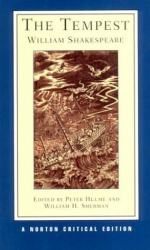|
|
The Tempest Topic Tracking: Old World/New World
Act 1
Old World/New World 1: Throughout this play different attributes are given to the 'Old World' being Europe and the civilized world, and the 'New World' or an uninhabited uncivilized island. During the writing of The Tempest, accounts of the New World, the Americas, and expositions of its men, animals and beasts were circulating through Europe. In this exchange between father and daughter, the characters discuss what has been left in the Old World: Dukedom and serving women. For Prospero and his daughter, living on the fringes of civilization means abandoning parts of their old world and implementing facets of the new. Miranda has been educated by her father in Old World terms but she has learned the secrets of the island from Caliban.
Old World/ New World 2: Caliban, a native to the island, rails against the institution of language and must be forced to submit. He also attempts to have sex with Miranda by force. Ferdinand, of the Old World, exhibits his desire for Miranda by submitting to her father.
Act 2
Old World/New World 3: Shakespeare's focus on the green and the lushness of the island contrasts it with the European world. The island is viewed as wild, and under-utilized. Gonzalo has a utopian view of the island. He wishes to tame it to the point that it will yield crops, but he also wished to abandon the fetters of civilization: order and hierarchy. In his new world there would be no chaos because everyone would be happy.
Old World/New World 4: Two drunken men of the servant class come to a wild island and imagine they are capable of ruling. They secure the loyalty of a native through gifts of liquor and the promise of benevolent rule.
Act 3
Old World/New World 5: In the assassination plot, Caliban instructs the drunkards to destroy Prospero's books, which represent his knowledge and power; they are emblems of the old world. Miranda is promised as a prize for this deed. Caliban describes the noises of the islands as dream-like. His speech about the interaction between dreams and life is poignant.
Old World/New World 6: The characters are struck with visions and thrown from a dream into a nightmare. This sort of magic is peculiar to the New World.
Act 4
Old World/New World 7: The elaborate ceremony of the spirits is a strange presentation of classical deities in the new realm. In this format, Prospero has introduced his knowledge of the classical pantheon to the spirit Ariel. This scene of the goddesses blessing the couples happens on the fringe of civilization where knowledge meets ignorance.
Act 5
Old World/New World 8: The happy ending pleases everyone as they return to the old world. The men return to their restored hierarchy, while Miranda returns happily engaged to Ferdinand. The young lovers themselves enter this hierarchy as a symbol of political union. Ariel is released from captivity upon their safe return, and the servants resume their acceptable duties.




